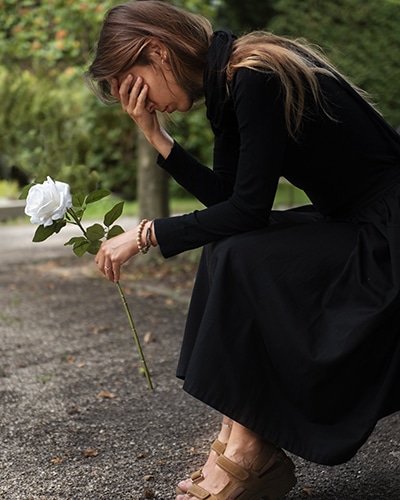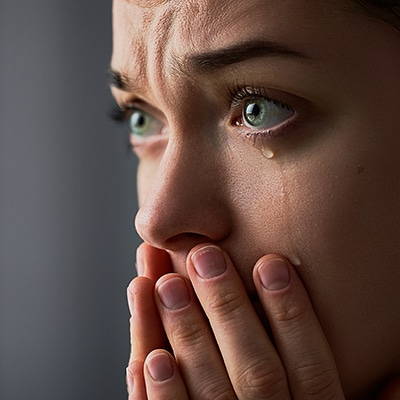Not all of us have had this experience, yet, many of us are capable of emotionally transporting ourselves to a place of relating to what it would be like to get the news that someone we know has passed. Hearing the news that a loved one has died can be an extremely distressing and emotionally overwhelming experience. People react to such news in various ways, and the impact on both the mind and body can be significant. Here’s an overview of what might happen:
Emotional Responses:
- Shock and Denial: Initially, many people go into a state of shock and disbelief. It can be difficult to accept that someone you care about has passed away. This shock can temporarily numb emotions, making it hard to process the news.
- Intense Grief: As the shock wears off, intense grief often sets in. Grief is a natural emotional response to loss, and it can manifest in various ways, including sadness, anger, guilt, and confusion. These emotions may come in waves and can be overwhelming.
- Physical Symptoms: Grief can have physical manifestations such as a tightness in the chest, a lump in the throat, headaches, fatigue, and difficulty sleeping. These physical symptoms are a result of the strong emotional response to the news.
- Cognitive Impact: Your ability to think clearly and make decisions may be impaired. It can be challenging to concentrate on tasks, and you might find yourself preoccupied with thoughts of the person who has passed away.
- Emotional Numbness: In some cases, people might experience a period of emotional numbness, where they feel disconnected from their emotions as a way of coping with the pain.




Behavioral Responses:
Crying and Expressing Emotion: Many people cry and express their grief openly. This is a natural and healthy way to process the emotions associated with loss.
Withdrawal or Isolation: Some individuals may withdraw from social interactions and isolate themselves from others as they try to come to terms with the loss.
Seeking Support: Others may seek support from friends, family, or a therapist to help them cope with their grief. Sharing feelings and memories with others can be comforting and therapeutic.
Changes in Appetite: Grief can affect appetite, leading to either a loss of appetite or overeating. These changes are common and may resolve with time.
Sleep Disturbances: Grief often disrupts sleep patterns, leading to difficulty falling asleep, frequent waking, or vivid dreams related to the deceased.
It is entirely normal to miss a loved one who has passed away for months, and in fact, it’s normal to continue missing them for a much longer period, often extending for years. Grief is a complex and individualized process, and its duration varies from person to person. There is no set timeline for how long grief should last, and it can be influenced by various factors including the nature of the relationship, the circumstances of the death, and the individual’s coping mechanisms.
Here are a few important points to consider:
- Grief Is Unique: Everyone grieves differently. Some people may experience intense grief for a shorter period, while others may continue to feel the pain of loss for an extended period of time.
- Anniversaries and Triggers: Certain events, anniversaries, or triggers (such as holidays or places associated with the person) can intensify feelings of grief, even years after the loss.
- Changing Nature of Grief: Grief often changes over time. While the intensity of grief may lessen, the longing and sadness for the loved one can persist, albeit in a less acute form.
- Life Adjustments: Grief can also be affected by how individuals adapt to life without their loved one. Some people find ways to incorporate the memory of their loved one into their lives and continue to have a sense of connection to them.
- Seeking Support: It’s important to seek support from friends, family, or professionals if you’re struggling with prolonged grief. Sometimes, unresolved grief can lead to complications such as depression or complicated grief, which may require additional help to manage.
It’s important to understand that grief is a highly individualized process, and there is no “right” way to grieve. Everyone copes with loss in their own way and on their own timeline. It’s also important to seek professional help if you find that your grief is severely impacting your ability to function or if you’re struggling with overwhelming emotions for an extended period.
Support from friends, family, and professionals can help individuals navigate the complex emotions and physical responses that come with the loss of a loved one. Over time, with support and self-care, most people find a way to adjust to life without their loved one while still cherishing their memory.

Dr. Yaro Garcia
Hello, I am Dr. Garcia, please call me Yaro. My degrees are in clinical psychology and I am a licensed mental health counselor. My approach is caring, warm, safe, non-judgmental, and straight forward. It is a difficult decision to seek therapy, I take time to build a trusting therapeutic relationship with you…
















